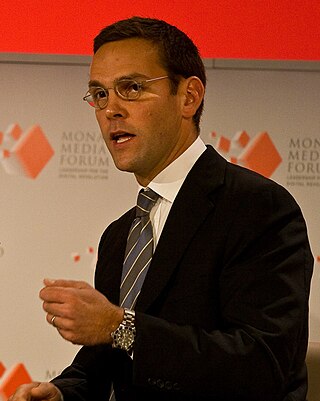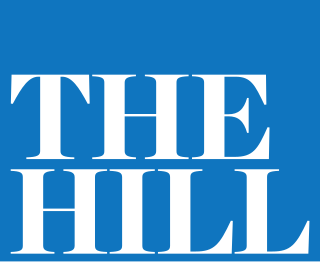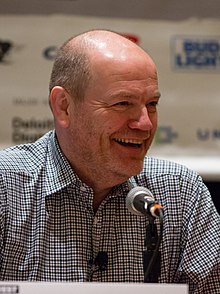
The New York Times Company is an American mass-media company that publishes The New York Times, its associated publications, and other media properties. Its headquarters are in Manhattan, New York City.

Newsnight is the BBC's news and current affairs programme, providing in-depth investigation and analysis of the stories behind the day's headlines. It is broadcast weeknights at 22:30 on BBC Two and the BBC News channel; it is also available on BBC iPlayer.

James Rupert Jacob Murdoch is a British-American businessman. He is the younger son of media mogul Rupert Murdoch and the former chief executive officer (CEO) of 21st Century Fox from 2015 to 2019.

Broadmoor Hospital is a high-security psychiatric hospital in Crowthorne, Berkshire, England. It is the oldest of England's three high-security psychiatric hospitals, the other two being Ashworth Hospital near Liverpool and Rampton Secure Hospital in Nottinghamshire. The hospital's catchment area consists of four National Health Service regions: London, Eastern, South East and South West. It is managed by the West London NHS Trust.
Justin Matthew King, CBE is an English businessman. King served as the CEO of J Sainsbury plc, parent company of the supermarket chain Sainsbury's, for ten years before stepping down in July 2014.

BBC News is an operational business division of the British Broadcasting Corporation (BBC) responsible for the gathering and broadcasting of news and current affairs in the UK and around the world. The department is the world's largest broadcast news organisation and generates about 120 hours of radio and television output each day, as well as online news coverage. The service has over 5,500 journalists working across its output including in 50 foreign news bureaus where more than 250 foreign correspondents are stationed.
This article outlines, in chronological order, the various controversies surrounding or involving the BBC.

The Hill is an American newspaper and digital media company based in Washington, D.C., that was founded in 1994.

Timothy Douglas Davie is a British media executive currently serving as the seventeenth Director-General of the BBC since 1 September 2020, taking over from Tony Hall. He was previously appointed as the acting director-general of the BBC on 10 November 2012 following the resignation of George Entwistle, until Hall took over the role permanently in April 2013.
The British Broadcasting Corporation (BBC) took its present form on 1 January 1927 when John Reith became its first Director-General. Reith stated that impartiality and objectivity were the essence of professionalism in its broadcasting. Allegations that the corporation lacks impartial and objective journalism are regularly made by observers on both the left and the right of the political spectrum. Another key area of criticism is the mandatory licence fee, as commercial competitors argue that means of financing to be unfair and to result in limiting their ability to compete with the BBC. Additionally, accusations of waste or over-staffing occasionally prompt comments from politicians and the other media.

The Cavalier Daily is an independent, student-run daily news organization at the University of Virginia. Founded in 1890, under the name College Topics, The Cavalier Daily is Virginia's oldest collegiate daily and the oldest daily newspaper in Charlottesville, Virginia.
HonestReporting or Honest Reporting is an Israeli media advocacy group. A pro-Israel media watchdog, it describes its mission as "combat[ting] ideological prejudice in journalism and the media, as it impacts Israel".
Politico, known originally as The Politico, is an American political digital newspaper company. Founded by American banker and media executive Robert Allbritton in 2007, it covers politics and policy in the United States and internationally, with publications dedicated to politics in the U.S., European Union, United Kingdom and Canada, among others. Primarily providing distributed news, analysis and opinion online, it also produces printed newspapers, radio, and podcasts. Its coverage focuses on topics such as the federal government, lobbying and the media.
Leslie Frank Hinton is a British-American journalist, writer and business executive whose career with Rupert Murdoch's News Corporation spanned more than fifty years. Hinton worked in newspapers, magazines and television as a reporter, editor and executive in Australia, the United Kingdom and the United States and became an American citizen in 1986. He was appointed CEO of Dow Jones & Company in December 2007, after its acquisition by News Corp. Hinton has variously been described as Murdoch's "hitman"; one of his "most trusted lieutenants"; and an "astute political operator". He left the company in 2011. His memoir, The Bootle Boy, was published in the UK in May 2018, and in the US under the title An Untidy Life in October of the same year.
Jason M. Levien is an American sports executive. He is the CEO and managing general owner of the Major League Soccer club D.C. United and co-owner of Swansea City, a Welsh football club, and the Brisbane Bullets, an Australian basketball club.
Daniel Nicholas Cohen is a British television executive. He currently serves as President of Access Entertainment. He was previously the Director of BBC Television from 2013 to 2015. Before that, he was the Controller of BBC One for three years, the BBC's principal television channel in the United Kingdom.

NPR, full name National Public Radio, is a privately and publicly funded non-profit membership media organization that serves as a national syndicator to 797 public radio stations in the United States of America.

Caroline Agnes Morgan Thomson, Baroness Liddle was chair of the charity Oxfam until October 2020. She is a former BBC executive and was the Corporation's chief operating officer, from 2006 to 2012 and she stood in for Mark Thompson, the former director general, when necessary.

Meredith Kopit Levien is an American media executive who is the chief executive officer of The New York Times Company.

Cambridge Analytica Ltd. (CA), previously known as SCL USA, was a British political consulting firm that came to prominence through the Facebook–Cambridge Analytica data scandal. It was started in 2013, as a subsidiary of the private intelligence company and self-described "global election management agency" SCL Group by long-time SCL executives Nigel Oakes, Alexander Nix and Alexander Oakes, with Nix as CEO. The well-connected founders had contact with, among others, the British Conservative Party, royal family, and military. The firm maintained offices in London, New York City, and Washington, D.C. The company closed operations in 2018 in the course of the Facebook–Cambridge Analytica data scandal, although firms related to both Cambridge Analytica and its parent firm SCL still exist.















